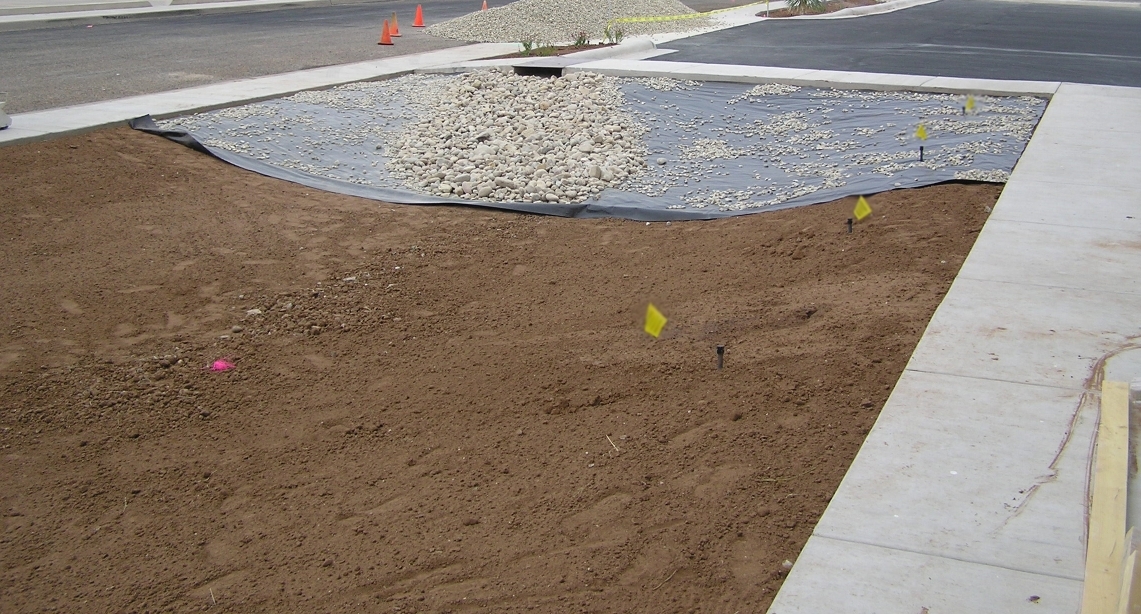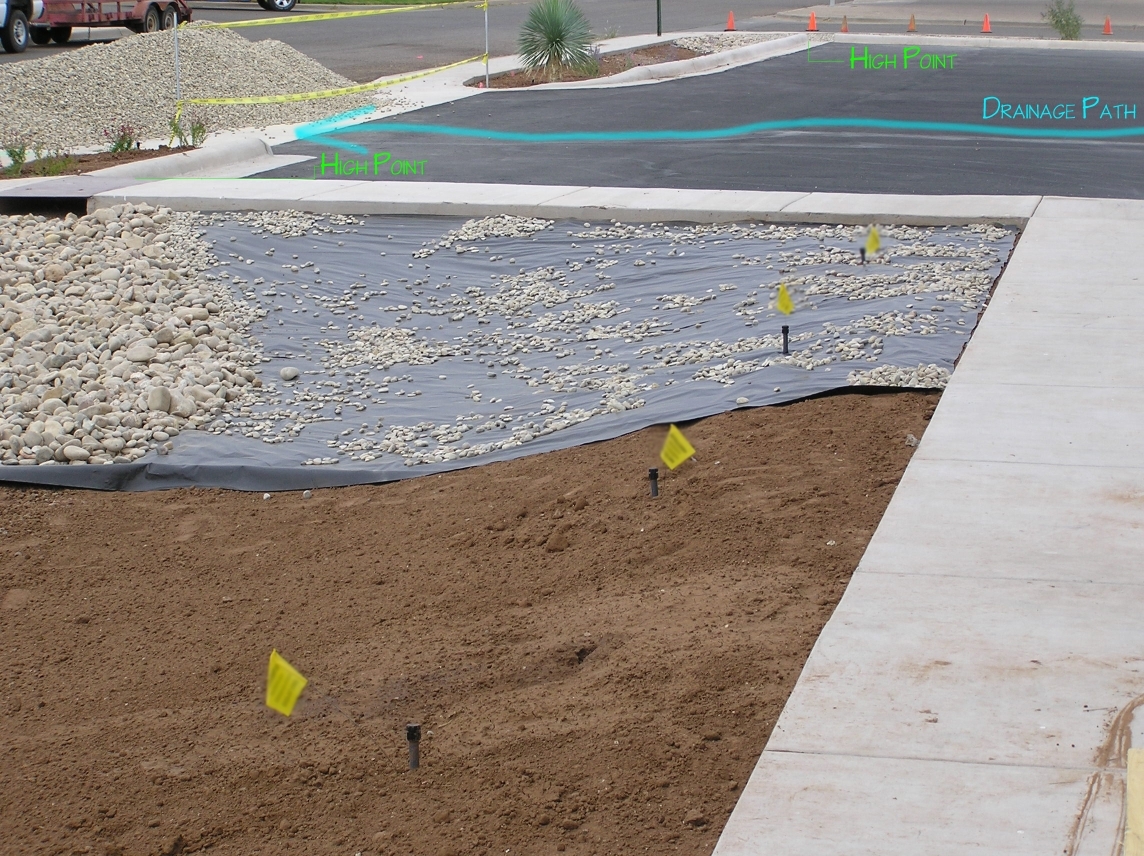Landscape Architecture for Landscape Architects › Forums › DETAILS & MATERIALS › What is going on here?
- This topic has 1 reply, 6 voices, and was last updated 14 years, 3 months ago by
 nca.
nca.
-
AuthorPosts
-
October 5, 2009 at 1:59 am #172749
 Jared ChaseParticipant
Jared ChaseParticipantThe reason I’m posting this is because I see this all the time in my area. There are multiple things that I see wrong with this landscape. This seems to be a common practice around here. I have noticed that many of the previous installs of this type around here always seem to fail. The biggest issue I see is the use of landscape plastics. Anyways, I’m curious to hear others opinions about this type of install or anything else you find wrong with this landscape install.


Here are the problems that I see with this install:
1) Landscape Plastic – Why would one use landscape plastics in a drainage catchment. The plastic is also used in the landscape areas in the background. This is a common practice in this area.
2) Grading – Although a little difficult to see from the picture. The two drainage catchment basins are at the highest point in the parking lot.
3) Drainage – It is easy to see the path the water drains. Instead of draining into the catchment basins, the water drains into the street.
4) Irrigation – I’m not quite sure why bubblers are being used on this slope. Seems this will be a erosion issue in the future.
5) Slope – Crape myrtles will be installed in the future around the area where the flags/bubblers currently are. To me, the slope is too steep to plant the crape myrtles on. I feel the better option would be some type of retaining wall to hold the bank and create a more level planting surface or at least make the slope less severe around the planting area.October 5, 2009 at 2:10 am #172759 ncaParticipant
ncaParticipantThe typar fabric theyre laying down is to stop weed growth which will inevitably happen, even in the rocks. Thing is, the fabric also inhibits spreading plants from growing and some water percolation. I think it’s kind of silly to have a parking lot drain into a swale like this with only rocks, no biofiltration or aesthetic quality. Are those spray heads sticking up?
Thats about all I can gather from a very quick glance and without looking at your comments…are they similar?
October 5, 2009 at 2:16 am #172758 Jared ChaseParticipant
Jared ChaseParticipantNick, the black stuff is actually landscaping plastic, not typar. I’m not a huge fan of typar either it is a much better option than the plastic that is being used around here. In my opinion, the plastic is the worst thing that can be used. It allows no gas exchange, water percolation, and like you said, doesn’t help with the weeds over the long term.
They are bubblers sticking up rather than spray heads. Your comments are pretty similar to what I said also. Soon I will take some more pictures of more of these installs around town that have failed and the majority of them have only been installed within the last 2 years.
October 5, 2009 at 3:11 am #172757 ncaParticipant
ncaParticipantplastic? I’m not sre I’ve seent that stuff…Is it like the black fabris you get at home depot in the landscraping dept?
It looks like they’re trying to completely isolate planet earth. Did a landscape architect have anything to do with this?
Maybe the bubblers justify the need for a swale.
October 5, 2009 at 3:31 am #172756 Jared ChaseParticipant
Jared ChaseParticipantIt’s not in the landscaping section but more so in the painting and home sections. It’s 6-mil black poly plastic that is made for painting, vapor barriers, covering equiptment, etc. Here is it also used by a lot of companies for a weed barrier. I hate the stuff. Here is the best picture I could find of this stuff. http://www.rd.com/how-to-choose-a-landscape-weed-barrier/article19570.html
There was no landscape architect involved with this project but it is being installed by “the best in town”.
October 5, 2009 at 10:44 am #172755 Trace OneParticipant
Trace OneParticipantIf that drainage pattern is correctly depicted by your arrows, it is not legal and should be flagged by the site inspector prior to issuing a C.O. on the building.You cannot dump all your water into street. It this located somewhere where it never rains, so they don’t relaly care?
October 5, 2009 at 8:44 pm #172754 Roland BeinertParticipant
Roland BeinertParticipantI hate any type of plastic weed barrier. Soil builds up on top, so the weeds grow anyway. People seem to think it will last forever, but it usually ends up disintegrating. Then when someone has to dig up the planting bed again, they end up with lots of tiny bits of plastic. I like using cardboard or newspaper instead. Both break down, but at least they add organic matter to the soil.
October 5, 2009 at 10:57 pm #172753 Jared ChaseParticipant
Jared ChaseParticipantYeah, plastic sucks! I have been to many projects where plastic was used by the previous landscaper and it is always a pain in the butt. The plant roots are almost always right on top of the soil and there are never any deep roots. It almost always ends up showing and it doesn’t allow any organic matter to break down into the soil like you said. Hopefully people in this area will begin to learn that this is the wrong thing to be doing.
October 5, 2009 at 11:00 pm #172752 Jared ChaseParticipant
Jared ChaseParticipantThat is part of the issue. We receive on average 15-20 inches of rain a year here. To me, that is enough to justify inspection. I think the biggest issue is that their is a lack of inspection in many different areas here.
October 31, 2011 at 7:35 pm #172751 Daniel KovachParticipant
Daniel KovachParticipantIs the structure in the upper right of the photo intended to be an overflow from the landscape area? (I can’t tell how the grading is working in the foreground…) In several areas, run-off needs to be retained on site up to the <___> year storm. This may make sense out of the stone, being intended as a filter zone(??)
November 1, 2011 at 2:11 am #172750 Tosh KParticipant
Tosh KParticipantLooks like a stormwater retention basin to me. Presumably it holds the first flush and any excess goes into the overflow (normally a catch basin or drain inlet), codes often require some kind of canopy cover, so that would explain the myrtles (though they seem a poor choice). As to why they irrigated it, that’s weird, either for the first few years to let the myrtles grow in or b/c it’s so dry.
1) to keep sedimentation from occurring in the stone area (on the east coast, it is necessary to keep the “bioswale mix” soils separate from the native soil, so I can see it as erosion control here.
2) I assume rainwater enters the catchment area then overflows into the CBs
3) that’s strange, though if there’s a CB along the gutter, that would be ok…
4) assuming it’s temporary, it may be for the first couple of years to establish the plants, otherwise, it may be for the contractor’s profit.
5) how steep is it? it looks fairly shallow. Walls are expensive, relative to a bit of grading.
-
AuthorPosts
- You must be logged in to reply to this topic.


